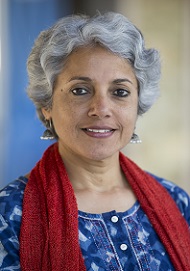Pandemic is an opportunity to strengthen public health systems”: WHO’s Dr. Soumya Swaminathan
Bengaluru: “This Public Policy conference is very relevant to the impact that the pandemic is having on people’s lives. The pandemic has exacerbated inequalities. And it has proved to be a learning opportunity for us to improve resilience and strengthen public health systems,” said Dr. Soumya Swaminathan, Chief Scientist, World Health Organization, at the valedictory of the XV International Conference on Public Policy & Management hosted by the Centre for Public Policy at IIM Bangalore.
“The focus needs to be on global collaboration when dealing with the virus – diagnostics, therapeutics, behavioural and mental health concerns, transmission, vaccine development, how the disease impacts children (learning, cognitive development) with schools being shut,” she explained, observing that the WHO has been working in all these areas. “The mortality rate is not going up in the second wave of the pandemic. This is probably related to demographics and other factors – we do not yet know why South Asia and Africa have lower mortality rates than Europe and the Americas.”
Moving on to the pandemic and its impact on public health systems, she said diseases like TB, cancer, malaria would see a definite impact. “There have been many warnings for pandemics and health emergencies – some localised like the Nipah virus, encephalitis, diarrhoea etc. Unless we have a system of strong surveillance, it can quickly go out of hand. The Integrated Disease Service Programme (ISDP), In India, helps to have surveillance at the district level and below. What we do not have is public health cadre that is devoted to not just detection and response but also prevention, management, training and capacity building.”
Dr. Swaminathan called for rights-based public health laws that have clear communication and command structures, empower states to create rules and set aside budgets for public health preparedness.
Participation of people and communities
The pandemic has shown up missing links in primary health care in India. “Health is not only about treating diseases; it covers food, sanitation, water, housing, risk factors like alcohol, tobacco. Where there is devolution of power, there is community participation and sustainable response,” she explained.
Responding to a question on how long the COVID pandemic will last, she said while WHO has no crystal ball, it would be safe to say that eradication is not possible so development of a vaccine can protect vulnerable populations.
Vaccine development
“By early 2021, we should have some good news. Then, there is the big challenge of being able to scale and distribute and allocate fairly around the world without letting the rich countries corner the limited doses. But India is a good position because many companies are working on vaccine development, either on their own or in collaboration, and India is a manufacturing hub for vaccines,” she said, adding that planning is required for adult immunization programmes. Dr. Swaminathan said USD 31 billion would be needed for vaccine distribution alone.
Climate change
“Illegal wildlife trade, rapid urbanization, deforestation and climate change aid the spread of viruses that jump species barriers. So, this is a good time to rethink our current practices and reduce our carbon footprint,” she said, also calling for increased investment in universal health coverage.
Priorities for the Indian policymaker
When asked what the top three priorities should be for the government, Dr. Swaminathan said timely and accurate data on mortality and disease prevalence is important. “Investments in the health system should increase at the primary healthcare centres so that healthy life expectancy can be addressed, universal health coverage should be provided and cadres of health workers should be trained and incentivized,” she responded, adding that investment in research and development of health systems should increase.
Prof. Hema Swaminathan, faculty from the Centre for Public Policy at IIMB, moderated the session.
In his closing remarks, Prof. Rishikesha T. Krishnan, Director, IIM Bangalore, said the challenge in India, across sectors, is on translation of policy goals into outcomes. “For instance, it was the local kirana shop who came to people’s rescue during the pandemic, not the e-commerce firms,” he said, adding that the field is ripe for research to bridge the policy-outcome gap.
Prof. M.S. Sriram, Chairperson, Centre for Public Policy, thanked the speakers, the sponsors – NABARD and GIC Re, and participants.
About the speaker
Dr. Soumya Swaminathan has been appointed Chief Scientist heading the division created to strengthen WHO’s core scientific work and ensure the quality and consistency of its norms and standards.
She was previously Deputy Director-General for Programmes (DDP) at WHO.
A paediatrician from India and a globally recognized researcher on tuberculosis and HIV, she brings with her 30 years of experience in clinical care and research and has worked throughout her career to translate research into impactful programmes.
Most recently, Dr. Swaminathan was Secretary of the Department of Health Research and Director General of the Indian Council of Medical Research.
From 2009 to 2011, she also served as Coordinator of the UNICEF/UNDP/World Bank/WHO Special Programme for Research and Training in Tropical Diseases (TDR) in Geneva.
She has sat on several WHO and global advisory bodies and committees, including the WHO Expert Panel to Review Global Strategy and Plan of Action on Public Health, Innovation and Intellectual Property, the Strategic and Technical Advisory Group of the Global TB Department at WHO, and as Co-Chair of the Lancet Commission on TB.
She received her academic training in India, the United Kingdom of Great Britain and Northern Ireland, and the United States of America, and has published more than 250 peer-reviewed publications and book chapters.

